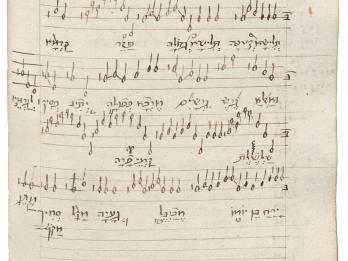Comedia de Amán y Mordochay (Comedy of Haman and Mordechai)
Anonymous
1699
Enter David, Moses, and Samson, all singing:
Blessed Adonai,
may Haman always die,
viva Mordechai,
Esther my lady.
Viva my lady,
blessed Adonai,
may Haman always die,
viva Mordechai.
David:
It is well that all see
our joy without measure,
for Mordechai and Esther
have brought us great pleasure,
and blessed may they be.
Moses:
Let no one stint on praise
for these adventurers brave:
our praise to them we raise,
from Haman we are saved.
Thus gaily we cavort
with bells to dance and sport.
Samson:
And thus together now
the three of us so order.
David:
I will lead as dancing guide,
you two following behind.
Moses:
All is well, so ring us in
and let the Follies here begin.
[After each one sings, all respond.]
David:
Those who honor Adonai
night after night, day after day,
let them now to Mordechai
sweet homage pay.
All:
Thanks to him we are free.
David:
From the murderous fiend
who wanted to slay us,
our praise, let us sing.
Moses:
Sing now to Esther
all night and all day,
our praises we pay
to honor and bless her.
All:
To Esther, who freed us.
Moses:
From the murderous fiend
who wanted to slay us,
praises we sing.
Samson:
For she saw that Haman,
the villain vile,
to the devil would send us
with spite and guile.
All:
Destroy us all, the order came down
Samson:
To the murderous fiend
who wanted to slay us;
yet she intervened.
David:
And so today
we have rung in the Follies,
everyone jolly,
spending this day
rejoicing and gleeful.
Moses:
Then, too, we shall eat,
for it is well known
that to truly feast
there must be meats.
Samson:
You are right, but take pleasure
with reason and measure.
David:
Yes of course, as you say,
but today we are gay,
so those in excess
must be pardoned no less
for that extra bite.
And so it must be
that no one today
may cease to be joyful—
the Rich will donate
to friends and brothers,
with alms to the poor
and gifts to each other.
Remembering the fear
from which we were saved,
let there be celebration
two days every year:
fourteen, fifteen Adar.
For thirteen Adar,
a day of despair,
now gives us cause
for mirth and elation.
Moses:
Let us not be the last,
but the first in this matter.
Samson:
And so let us go
find more guests for the party.
[They exit, as the King, Mordechai, and Esther enter.]
Mordechai:
Great thanks I owe
for your Highness’s mercy.
King:
And I for the grace
you yourself have shown.
Esther:
May the lord ever bless
your Highness’s throne.
King:
The star-studded sky
is a timely reflection
of Esther’s resplendence.
Now, how did you manage
your vengeance?
Esther:
May your life be enhanced
for the aid you extended.
King:
And so may the heavens
reveal your great virtue:
the world must see
that the Hebrew nation
owes you their salvation.
All those inside are singing:
Long live those three,
King, Mordechai, and Esther.
May heaven bless them,
and earth give them pleasure.
Ever be it so,
for their greatness is such
that we must proclaim:
Long live those three.
King:
What news do I hear,
what things do I see?
Mordechai:
My lord, we the Hebrews
have come to give thanks.
King:
You have already given me
comfort abundant
to sense your great pleasure
and see you triumphant.
Mordechai:
May heaven bless
your Royal Highness.
King:
But enough of these compliments.
Three hearts today
are beating as one.
And so, may the two of you
long life enjoy
and well-earned renown.
[The King exits.]
Esther:
After lauding God,
this I propose,
that this joyous day
be yearly remembered
with dancing and praise.
Mordechai:
So shall it be,
The lord will be praised
with many a psalm,
For we saw the traitor
reclaimed by the devil.
Now let us go
and give thanks to the lord.
Esther:
We shall go joyfully,
all night and day,
giving thanks and praise.
Mordechai:
Now sing the glory
of the lord divine,
keeping ever in mind
this triumphant day
and the death of cursèd Haman.
Translated by .
Michelle McKay
Aynesworth
Credits
Isaac Cohen de Lara, ed., Comedia famosa de Amán y Mordochay (Comedy of Haman and Mordechai) ([Leiden]: 1699), 43–48.
Published in: The Posen Library of Jewish Culture and Civilization, vol. 5.



